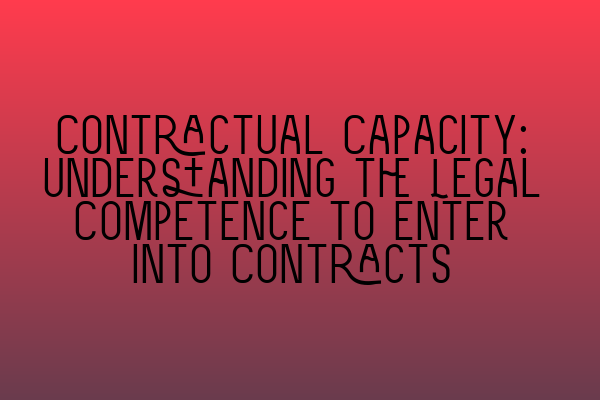Contractual Capacity: Understanding the Legal Competence to Enter into Contracts
Contracts are the backbone of any legal system. They govern a wide range of transactions, from simple agreements between individuals to complex business deals. But for a contract to be legally binding, all parties involved must have the necessary contractual capacity.
In this article, we will explore the concept of contractual capacity and its importance in contract law. We will discuss the legal principles surrounding this concept and provide practical insights into how it affects various types of contracts. So, let’s dive in!
What is Contractual Capacity?
Contractual capacity, also known as legal competence, refers to the legal ability of a person to enter into a contract. It determines whether the parties involved have the mental capacity and legal authority to understand the terms of the contract and be bound by its obligations.
Essentially, contractual capacity ensures that all parties entering into a contract are capable of making informed decisions and understanding the consequences of their actions. It protects vulnerable individuals from being exploited and ensures fairness and equity in contractual relationships.
Who Has Contractual Capacity?
To determine whether a person has contractual capacity, the law generally focuses on two factors:
- Age: In most jurisdictions, the age of contractual capacity is set at 18 years old. Individuals below this age are considered minors and lack the legal capacity to enter into binding contracts. However, there are exceptions for contracts for necessaries, educational loans, and employment contracts.
- Mental Capacity: A person must also have the mental capacity to understand the nature and consequences of the contract. This includes having a sound mind, being free from mental illness or impairment, and not being under the influence of drugs or alcohol.
It’s important to note that contractual capacity can vary depending on the nature of the contract. For example, a person may have the capacity to enter into a simple contract for purchasing goods but may lack the capacity to understand complex business transactions.
Implications of Lack of Contractual Capacity
If a person lacks contractual capacity, any contract they enter into may be considered voidable. This means that the party lacking capacity has the option to either affirm the contract or void it. The purpose of this is to protect individuals who are vulnerable due to their age or mental state.
If a party wishes to void a contract due to lack of capacity, they must demonstrate that they lacked the ability to understand the terms of the contract at the time of entering into it. They may need to provide evidence such as medical records or expert opinions to support their claim.
However, it’s essential to note that certain contracts, such as contracts for necessaries, educational loans, and employment contracts, are enforceable even if one party lacks full contractual capacity. These exceptions exist to ensure that individuals are not left without basic necessities, educational opportunities, or employment rights due to their limited capacity.
Conclusion
Understanding contractual capacity is vital for anyone involved in contract law. It ensures that all parties in a contract are on an equal footing and have the necessary legal capacity to make informed decisions. By knowing the factors that determine contractual capacity and the implications of its absence, you can navigate contract negotiations with confidence and protect your rights.
If you have any questions about contractual capacity or require legal advice related to contract law, don’t hesitate to reach out to SQE Contract Law. Our team of experienced solicitors will be more than happy to assist you.
Related Articles:
- Barrister vs. Solicitor: A Comprehensive Comparison
- Embracing the Rise of Virtual Law Practices
- Unveiling Real-Life Case Studies: Insights into Legal Practice and Decision-Making
- Exploring Solicitor Salaries in the UK: Average Earnings and Factors Affecting Income
- Mastering Client Relationship Management: Skills for Solicitors to Enhance Trust and Loyalty
